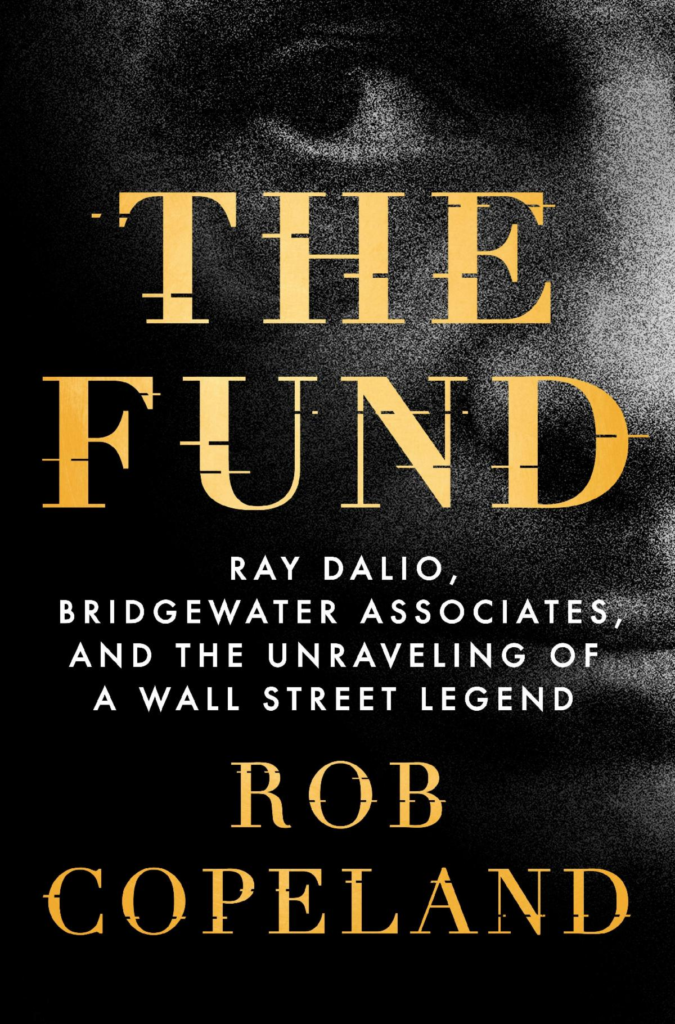“The great thing about Bridgewater stories is I never have to exaggerate a single thing for it to be totally insane.” -Anon.
Here’s to the inside sources, tipsters, and whistleblowers who helped make The Fund by Rob Copeland possible. The above quote is from the Acknowledgements, and it captures what we learn over the preceding 300 pages: Bridgewater Associates, aka the world’s biggest hedge fund, is by these accounts a veritable nut house. Its founder, Ray Dalio would of course disagree, and we’re warned from the front flap that he doesn’t want us to read this book. Well, doubtless he’d support the good parts – that he spun friends & family funds into fortune, that when on top of his investment game his skill “was electrifying” – just not what is expertly revealed: that the method to his madness is cruelty. One can make a pile of dough toiling away at the firm but perhaps only by surviving a paranoid culture built around relentless monitoring and abject humiliation.
The running theme is an obsession over the elimination of mistakes. In Dalio’s view, each instance provides “an opportunity to dive into the individualistic human psychology that led to errors,” writes Copeland. As a manager, surely you can see the point of the mission – to err may be human, but no organization should tolerate repeated issues going uncorrected. What’s alarming about Bridgewater is the backstabbing, toxic arena its founder created. To help determine the root cause of matters as inane as wilted peas at the cafeteria salad bar, Dalio instituted an issues log with weekly reporting minimums required to earn one’s bonus. Read: if there was an incident that should’ve been previously logged and wasn’t, all those aware would be docked pay. This evolved into The Dot Collector, a vicious scoring device used to rate co-workers, for all to view. Ostensibly done to encourage so-called radical transparency, if you got dinged by the boss you’d be crucified by all others, lest ol’ Ray be viewed as anything less than omniscient. “There was no escaping the pile-on,” we learn. “It was death by dots.”
To his credit, while reporting on such lunacy the author does endeavor to illuminate what works at the hedge fund. Its assets under management kept doubling, eventually ballooning to well over $100B, and Bridgewater has enriched those who’ve outlasted constant audio taping and even public trials – seriously – with their sanity somehow intact. (Spoiler, there are some ugly exits.) But the sad, cautionary tale here is one of an emperor scurrying about, nude and desperate to remain relevant in the business world as he ages out. It’s thick with irony, too: while Dalio attempts to oversee the development of technology that could be packaged and sold to companies looking to capitalize on his much-ballyhooed principles, “he also stuck to his historic rules, even as they became more stale with each passing year as rivals leaped forward with competing systems.” Now Dalio’s exit – something he’s spoken about the past 15 years, right around the time year-over-year performance started to wane – is underway with countless misgivings in its wake. So, a recommendation: read Copeland’s book and then gift it to that special narcissist in your life. Maybe they’ll take it to heart.
If you have anything to say about this – or book recommendations – kindly post below (rather than emailing me) to spark conversation. Thank you!


Very cogent review. Recommended reading: “Of Time and Turtles: Mending the World, Shell by Shattered Shell” by Sy Montgomery. Mariner 2023.
I keep seeing that one on bestseller lists, John. Will check it out. Much appreciated!
While I’ve admired his insights into economic issues (and especially the historical research into patterns going back ~500 years), I’ve always been skeptical of his management principles.
In the highly competitive investment business, there’s certainly a need to reexamine and learn from mistakes. But his principles felt extreme to me and seemed to ignore the human element. An organization where one’s colleagues were motivated exclusively by financial reward and staying in the good graces of a mercurial boss would be an awfully depressing place to work.
Chris, you make me want to go back and scrutinize my report. So well said! “Staying in the good graces of a mercurial boss…” – right on. Thank you for this.
Chris,
As always, a nice and spicy review that makes me want to read the book! I had no idea. Now get back to work, loser! (I am already trying out some of the principles.)
And it’s working, John! I already feel guilty replying to you during pay-time when I should be hammering the phone. So… thank you? 🙂
It always amazes me that these types of businesses are so successful. Maybe it is a rare thing to find a hedge fund that isn’t run by the insane and/or meglomaniacs. Power run amok is just one of the darker sides of capitalism.
It just confirms that I should keep on my path of self driven investing in stocks and bonds. No, I will never be rich, but I also won’t be part of the problem.
Thanks for your great summaries and suggested readings Chris. I always enjoy them… even more than your music recommendations.
Terrific insights, Karen. We all have to sleep at night, and it sounds like you can rest well with that strategy. Thank you for contributing to the conversation and here’s to not being part of the problem!